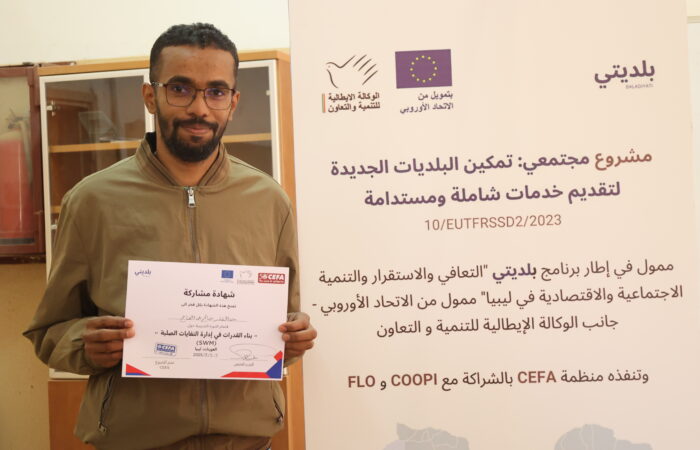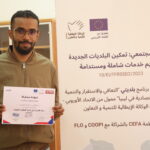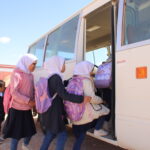The Ministry of Foreign Affairs, the Ministry of Local Government, the Ministry of Planning, the European Union, AICS, UNDP, and UNICEF come together to mark the conclusion of the Baladiyati programme and its results across Libya.

Tripoli, 3rd September 2025 – Today, the Italian Agency for Development Cooperation (AICS), the European Union, the United Nations Development Programme (UNDP), and the United Nations Children’s Fund (UNICEF), together with Libyan national and local authorities, celebrated the Final Event of the EU-funded “Baladiyati – Recovery, Stability and Socio-Economic Development in Libya” programme at the Corinthia Hotel in Tripoli.
Launched in 2018 and funded by the European Union through the EU Emergency Trust Fund for Africa with a total budget of €76.2 million, Baladiyati is one of the largest initiatives supporting local governance and basic services in Libya. The programme has operated in 40 municipalities—21 of which in Southern Libya during its second phase—strengthening local institutions and improving access to essential services including health, education, sanitation, and livelihoods. Over 700 priority interventions have been implemented, benefiting more than 3 million people.
Today’s event brought together institutional partners and beneficiaries to reflect on achievements and lessons learned, including high-level representatives from the Ministry of Local Governance, Ministry of Planning, Ministry of Foreign Affairs, the Delegation of the European Union to Libya, the Embassy of Italy, and the implementing agencies addressed the audience, along with mayors from the 21 municipalities involved.
The event celebrated the shared journey of Baladiyati across Libya, followed by a symbolic closure of the programme. Participants then joined an interactive exhibition space, featuring visual materials, panels, and thematic stands to showcase tangible results on the ground.
Among the highlights of the exhibition were live demonstrations by beneficiaries of vocational training, a testament to the skills and opportunities created by the programme’s support for alternative livelihoods. Temporary panels displayed images, data, and maps to illustrate the impact of the interventions carried out by AICS, UNDP, and UNICEF. An interactive map of the projects implemented across the 21 municipalities was also featured.
The event underscored the success of the coordinated effort among Libyan authorities, the European Union, and implementing partners to enhance resilience, promote social cohesion, and strengthen essential services for communities in need.
The Ministry of Foreign Affairs, represented by the International Cooperation Department, stated that the “Baladiyati” program serves as a practical model of international cooperation supporting Libya’s stability and development, emphasizing: “The Baladiyati program demonstrates how international partnerships can contribute to strengthening institutional stability in Libya, addressing urgent needs, and laying the foundations for sustainable long-term development, through the coordination of efforts among local and international partners.”
The Minister of Local Government, H.E. Abdul Shafi’ Al-Juwaifi, extended appreciation for the support provided by the European Union, AICS, UNDP, and UNICEF to Libyan municipalities: “The achievements of the Baladiyati programme in improving basic services across our municipalities clearly demonstrate the effective collaboration between Libya and its international partners. By developing infrastructure, enhancing water services, and empowering local communities through support for small enterprises, we are making meaningful progress toward improving the quality of life for Libyan citizens.”
Mr. Marton Benedek, Head of Cooperation, EU Delegation to Libya emphasized the significance of the programme and its positive impact on Libya: “Baladiyati stands among the most impactful EU-funded initiatives in support of the government’s decentralisation strategy, implemented in close coordination with the Ministry of Local Governance. We are proud of the effectiveness of our implementing partners, Italy, UNDP and UNICEF, in leveraging our partnership with the Libyan central and local authorities to benefit up to 3 million Libyans and over 65,000 Sudanese refugees. As the biggest partner of Libya, we reaffirm the European Union’s commitment to supporting the Libyan efforts to strengthen local institutions and foster inclusive development across Libya”.
The Italian Ambassador in Libya, H.E. Gianluca Alberini, reiterated Italy’s commitment to strengthen cooperation for stability and improved welfare across Libya: ” The partnership between Italy and Libya remains steadfast and enduring. Italy reaffirms its full commitment to strengthening bilateral cooperation aimed at fostering stability, prosperity, and sustainable development across Libya. Our collaboration is grounded in mutual respect, shared values, and a common vision for peace and regional security. In close coordination with Libyan institutions, Italy continues to support efforts to enhance local governance and improve the people’s quality of life throughout the country. We stand alongside Libya as a neighbor and a friend, committed to a future of shared growth and resilience.”
AICS Regional Director, Ms. Isabella Lucaferri, emphasized the Italian Cooperation’s commitment to supporting local governance and enhancing essential services for the Libyan population: “Today, we gather to celebrate this milestone represented by the Baladiyati programme, funded by the significant contribution of the European Union,—an initiative that reflects the strength and consistency of our partnership throughout the past years of joint efforts. This programme not only demonstrates the concrete progress achieved in reinforcing local governance and community resilience, but most importantly, it establishes a solid foundation to build on for future cooperation.”
“Baladiyati has stood as a testament to the resilience and strength of Libyan communities. Together with local partners and through targeted support, it laid the foundations for lasting peace and stability by fostering social cohesion and empowerment for a more inclusive and sustainable future in addition to the rehabilitation of community infrastructure.” stated UNDP Resident Representative, Ms. Sophie Kemkhadze.
“Through the Baladiyati programme, UNICEF supported Libya’s youth by establishing youth clubs and providing life skills and entrepreneurship training. UNICEF also developed Life Skills Manuals and conducted a Youth Employability Study to expand opportunities for young people. This work was made possible through a close partnership with the Ministries of Local Governance, Youth, and Education, collectively working to build a better future for Libya’s youth.” expressed UNICEF Representative to Libya, Mr. Mohammad Fayyazi.
More information about the programme:
Angela Ferraro, International Administrative and Financial Manager, AICS Tunis angela.ferraro@aics.gov.it
Camilla Pante, Partnership specialist, UNICEF Libya cpante@unicef.org
Rawan El Muntaser, Communication Associate, UNDP Libya halfnek@unicef.org
Media inquiries:
Marion Piccio, Communication Officer, AICS Tunis marion.piccio@aics.gov.it
Heba Alfnek, Communication Associate, UNICEF Libya halfnek@unicef.org
UNDP Libya, media.ly@undp.org





